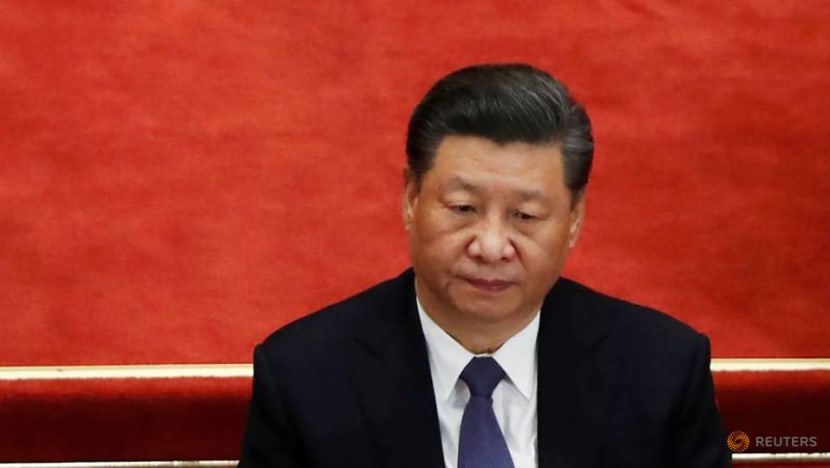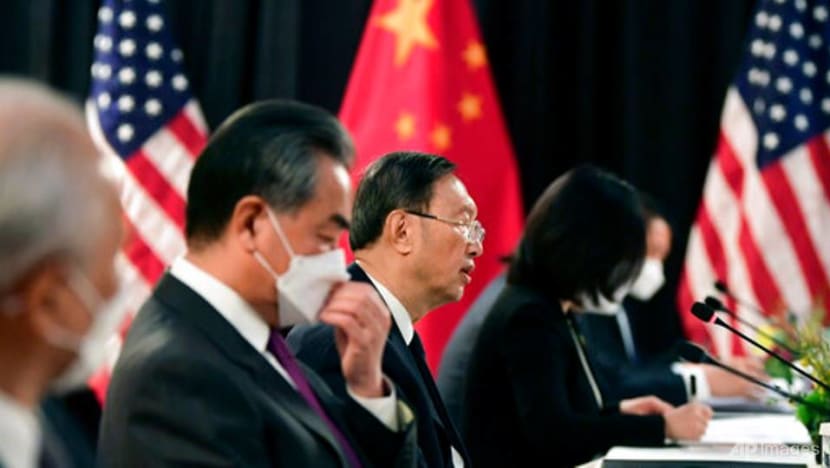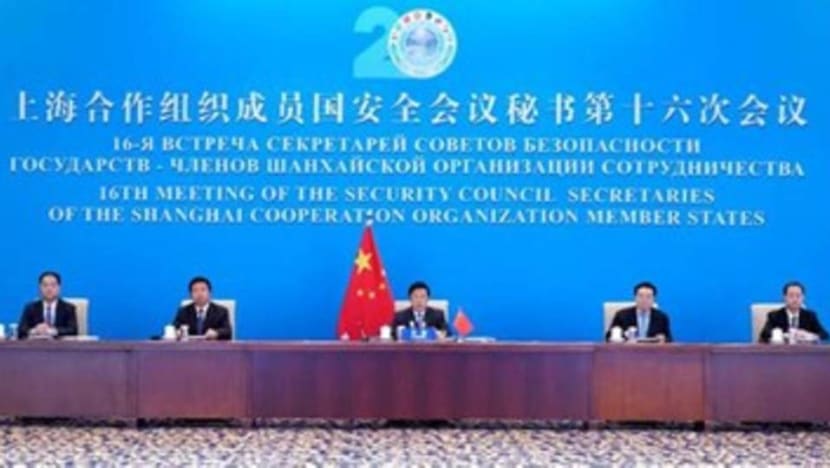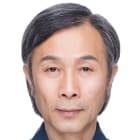Commentary: China may have a spy problem of its own
Dong Jingwei’s supposed disappearance coaxes China’s troubled history littered with past cases of state secrets being spilled, espionage and defection into view, says Professor Bo Zhiyue.

FILE PHOTO: Chinese President Xi Jinping attends the opening session of the Chinese People's Political Consultative Conference at the Great Hall of the People in Beijing, on May 21, 2020. (Photo: REUTERS/Carlos Garcia Rawlins)
WELLINGTON: The Chinese Communist Party’s (CCP) centennial anniversary celebrations may have made headlines last week.
But amid the celebratory notes of how the country has arrived and how much the party has been pivotal to that narrative, observers reading the tea leaves to discern what big challenges lie ahead for the country may do well to look at certain, less well covered developments in the lead-up.
For while Chinese President and CCP General Secretary Xi Jinping’s leading of top Chinese communist leaders to renew their pledges of loyalty to the party on Jun 18 looked right at home, the ceremony was significant because it included Vice-president Wang Qishan, who had been widely rumoured to have fled China.
Had it been true, Wang would have been the highest-ranking official to defect in recent decades.
The last being Lin Biao - then heir apparent to Mao Zedong who was said to be fleeing China for the Soviet Union, after a failed assassination attempt on his mentor’s life when his plane crashed in 1971.
READ: Commentary: US must give up on containing China when accommodation is unavoidable
THE STRANGE CASE OF DONG JINGWEI
While those suspicions regarding Wang have been smashed, there are growing concerns over Dong Jingwei, vice-minister for state security, the latest official to have come under the spotlight for supposedly defecting.
On that same day as the demonstration of loyalty, Dong was reported to have separately chaired a meeting to discuss implementing new counter-espionage regulations that came into effect in April.
The meeting apparently emphasised the importance of not only capturing foreign spies but also their Chinese collaborators and financiers behind the scenes.
However, unlike most official events covered by the mainstream Chinese media, there was scant details of the meeting – with no video or photo of the proceedings or mention of its location.
READ: Commentary: The changing meaning of political legitimacy for the Chinese Communist Party
The meeting is even more curious because of reported rumours that Dong, a current office holder, had already surrendered himself to US Defense Intelligence Agency under the pretext of visiting his daughter in the country in February.
There is talk among US and Australian media outlets he is the source of the Wuhan lab leak theory, which explains in part the US’ renewed confidence in the idea despite not presenting any new, overt evidence.
Some conservative sites even suggest Politburo member Yang Jiechi and Foreign Minister Wang Yi had asked Secretary of State Antony Blinken and National Security Advisor Jake Sullivan for Dong to be repatriated to China during the Anchorage talks.

If true, Dong’s defection could prove devastating for China’s interests and the personal security of President Xi.
As the head of Hebei Provincial State Security Department from February 2006 to March 2017, Dong reportedly recruited bodyguards for the central leadership in general and President Xi in particular.
PAST DEFECTIONS
Many high-ranking Chinese officials have been caught in the shadowy world of intelligence agencies engaging in human intelligence operations including espionage, defections and penetration of government organisations.
Such cases are usually kept deliberately low profile and quiet, given the humiliation not to mention national security considerations China may have in concealing how much it knows. And so it can be challenging to piece together the puzzle of how big the problem is.
But what we know is in more recent years is these include former Chinese ambassador to South Korea Li Bin in 2006 who was thought to have passed state secrets to Seoul and the former head of China’s nuclear power programme Kang Rixin in 2010 suspected of spiling nuclear secrets to an undisclosed foreign nation.
Both were found guilty of corruption with details of their cases kept under wraps.
READ: Commentary: Removal of rising political star reveals murky nature of Chinese elite politics
Even within the Ministry of State Security, China’s counter-intelligence apparatus, there have been cases of officials passing information to foreign countries, to the point where Hu Jintao had to intervene personally in 2012.
China has also witnessed defections in the past though these seem few and far in between.
Yu Qiangsheng, an elder brother of Yu Zhengsheng, former Politburo Standing Committee member and Chairman of the Chinese People’s Political Consultative Conference, defected to the US in 1985.
READ: Commentary: Why is former Chinese premier Wen Jiabao’s eulogy about his mother being censored?
A director of China’s State Security Ministry, Yu’s defection compromised China’s human intelligence assets. The spy chief had exposed the top Chinese spy, Larry Wu-tai Jin, a CIA analyst, who had worked for the US government for 37 years but was secretly a mole for China, as well as Bernard Boursicot, a French diplomat recruited by China through a honeypot trap.
DONG’S REAPPEARANCE IN CHINA
As if it couldn’t get curiouser, Dong’s case does. On Jun 23, Dong reportedly reappeared in Beijing, together with Public Security Minister Zhao Kezhi who attended the 16th Meeting of Security Council Secretaries of the Shanghai Cooperation Organisation Member States via video.
Attention to the meeting was first drawn by a spokesperson for the Chinse Embassy in Washington who had been asked about Dong’s defection and categorically denied it.
Yet, compared to photos and videos of the last meeting held on September 2020, netizens have pointed out that the photo from this 16th edition looked photoshopped and the video spliced together with appearances from past meetings.

WHERE IS DONG?
There is one other theory apart from defection that could fit the above: That Dong has been arrested by Chinese intelligence agencies – for reasons of corruption or some other, nationally embarrassing unlawful behaviour including espionage.
Observers have pointed to similar developments in China’s arrest of its top envoy, Ma Jisheng amid allegations of spying for the Japanese. Ma had simply vanished in China after such charges surfaced in 2014.
READ: Commentary: China’s COVID-19 successes - credible at home, not so much abroad
READ: Commentary: What’s really behind fresh calls for investigations into COVID-19 origins
Dong’s case may remain a mystery. Over the last two weeks, a US official speaking to Newsweek said the idea they had Dong was “absolutely untrue”.
But if he is indeed missing and not at his post as claimed, we should expect a major reshuffle in China’s internal security ranks.
The incident is significant against the backdrop of a growing number of CCP cadres being caught in President Xi’s anti-corruption drive.
Such efforts have long been framed as either a commendable way to rid the country of corrupt leaders or an abhorrent move in President Xi’s silencing of political enemies and consolidation of power.
Both interpretations might still hold water. But perhaps this latest incident with Dong suggests a third way to view China’s corruption drive when such cases are reported in the media: As cases of counter-intelligence the country is struggling with.
The CCP may have kept a lid on the problem but could it spiral out of hand one day and pose a serious threat to President Xi? We can only watch and try to read the tea leaves.
Professor Bo Zhiyue is founder and president of the Bo Zhiyue China Institute, a consulting firm providing services to government leaders and CEOs of multinational corporations.














